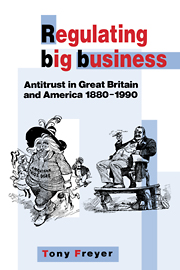Book contents
- Frontmatter
- Contents
- Preface
- Introduction
- 1 The response to big business: the formative era, 1880–1914
- 2 The divergence of economic thought
- 3 The political response
- 4 The courts respond to big business
- 5 The impact of World War I, 1914–1921
- 6 Tentative convergence, 1921–1948
- 7 A British antimonopoly policy emerges, 1940–1948
- 8 Uneven convergence since World War II
- Conclusion
- Notes
- Index
Introduction
Published online by Cambridge University Press: 21 January 2010
- Frontmatter
- Contents
- Preface
- Introduction
- 1 The response to big business: the formative era, 1880–1914
- 2 The divergence of economic thought
- 3 The political response
- 4 The courts respond to big business
- 5 The impact of World War I, 1914–1921
- 6 Tentative convergence, 1921–1948
- 7 A British antimonopoly policy emerges, 1940–1948
- 8 Uneven convergence since World War II
- Conclusion
- Notes
- Index
Summary
Late in the nineteenth century a new form of capitalism emerged in Great Britain and the United States. Before the revolutions in modern communication and transportation, the owners of firms personally managed the processes of production, distribution, transportation, and communication. Generally, these business enterprises were family run and comparatively modest or small in size. By the end of the century, however, technological innovation and mass markets fostered the development of large-scale corporate structures, engendering the separation between owners and operators. In this new form of capitalist enterprise managers were increasingly the principal decisionmakers. Accordingly, an economic order controlled by small-scale, family firms gradually gave way to one dominated by giant corporations and managerial capitalism. In both nations this economic transformation spawned social and political tensions, compelling the public and policymakers to decide upon the appropriate response to big business.
A primary focus of public discourse was antitrust. Before World War I the British considered but rejected antitrust; in America, however, it became a fundamental political and cultural value. During the 1920s, as Britain's corporate economy gradually caught up with the United States in its reliance upon managerial centralization, the demand for government intervention grew. Large and small business groups, labor, economic experts, and publicists debated the appropriate policy. Eventually, supporters of governmentally supervised cartelization and monopoly won.
During World War II, however, a new consensus emerged in Britain. Based upon the use of administrative investigation, publicity, and ultimately the selective prohibition of certain trade restraints British policymakers hoped to foster full employment and economic efficiency.
- Type
- Chapter
- Information
- Regulating Big BusinessAntitrust in Great Britain and America, 1880–1990, pp. 1 - 10Publisher: Cambridge University PressPrint publication year: 1992



